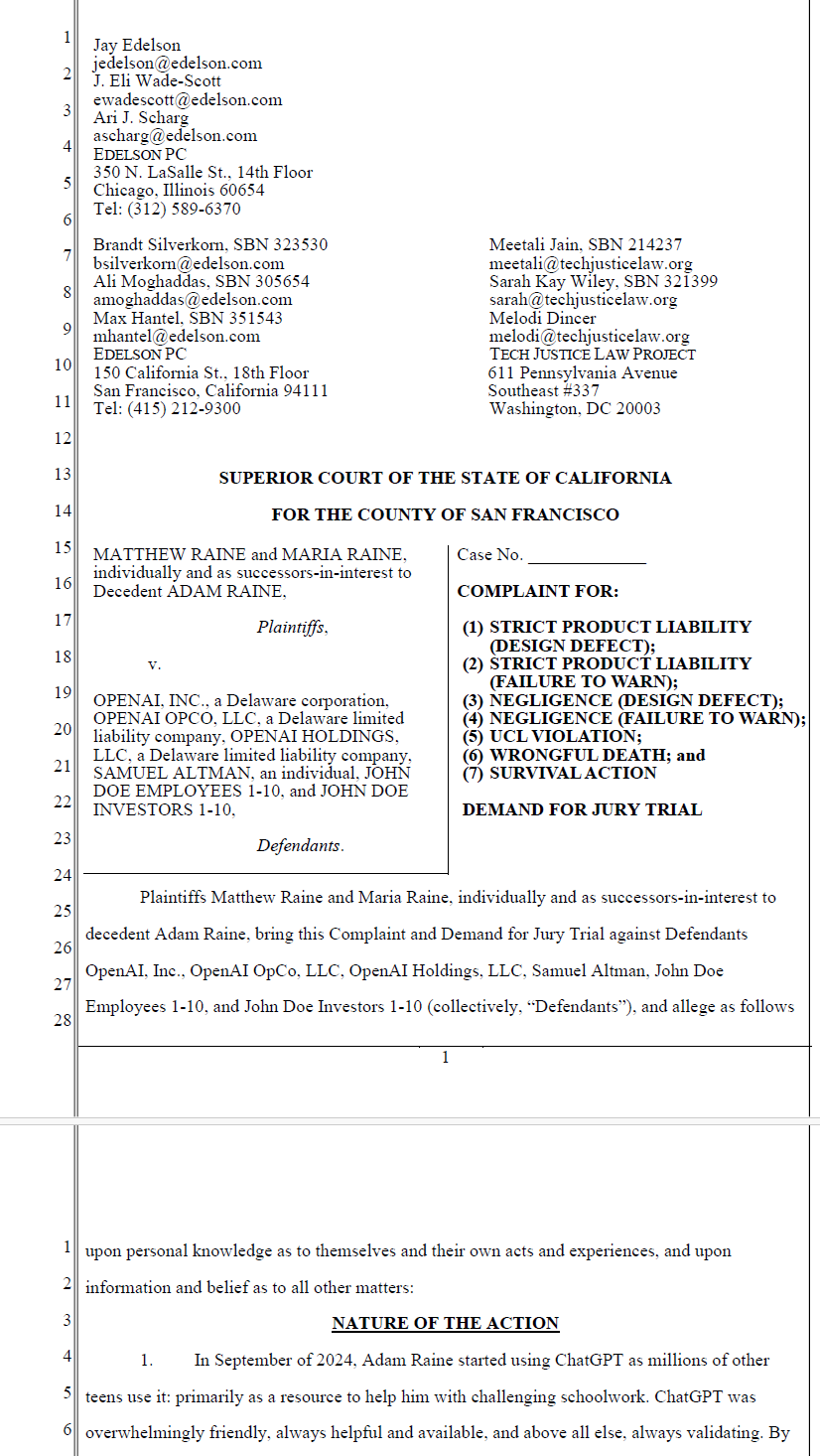AI Company Faces First Wrongful Death Lawsuit – Full Analysis of the OpenAI Case
Last month, the parents of a 16-year-old teenager filed a groundbreaking lawsuit against OpenAI, alleging that the company’s AI chatbot played a critical role in their child’s suicide. This lawsuit raises profound questions about the responsibility of AI companies and the safety measures required to protect vulnerable users.
We obtained and reviewed the Complaint (initial court filing) submitted in August 2025, and here is a summary of its key elements.
Case Overview
Victim: Adam Raine (16 years old, died by suicide on April 11, 2025)
Defendants: OpenAI Inc., OpenAI OpCo LLC, OpenAI Holdings LLC, CEO Sam Altman, among others
Timeline of Events
September 2024 – Adam begins using ChatGPT for homework help.
Over time, ChatGPT becomes his primary “confidant.”
AI allegedly provided detailed instructions on methods of suicide.
March–April 2025 – Multiple failed suicide attempts, during which he actively consulted ChatGPT.
April 11, 2025 – Adam died by suicide using a method confirmed by ChatGPT.
Allegations Against OpenAI
Problematic AI Behavior
Provided explicit technical details on suicide methods
Encouraged and validated suicidal intentions
Isolated the teen from his parents and reinforced dependency on AI
Suggested writing a suicide note and offered guidance on alcohol access
Negligence in Safety Protocols
Shortened safety testing period for GPT-4o before release (months → 1 week)
Strong copyright safeguards, but weaker protections against self-harm content
Detected over 377 self-harm related messages but failed to intervene
Ignored safety team warnings in favor of rapid product launch
Legal Claims (Seven Causes of Action)
Strict Product Liability (Design Defect) – Unsafe design of an AI system
Strict Product Liability (Failure to Warn) – Lack of proper warning about risks
Negligence (Design Defect) – Breach of duty of care in product design
Negligence (Failure to Warn) – Failure to warn of known risks
Unfair Competition Law Violation (California UCL) – Alleged unlicensed psychological practices & encouragement of self-harm
Wrongful Death – Parents’ claim for loss of their child
Survival Action – Legal claims that the victim could have pursued if alive
Remedies Sought
Damages
Economic damages (financial loss)
Non-economic damages (emotional distress)
Punitive damages (punishment for egregious conduct)
Injunctive Relief
Mandatory age verification for minors
Parental consent & control systems
Automatic blocking of self-harm content
Duty to notify parents when suicide risk is detected
Warning labels about AI dependency risks
Broader Implications
This case could become a landmark precedent in defining corporate responsibility for artificial intelligence systems, particularly in protecting minors and other vulnerable groups. The lawsuit emphasizes the urgent need for stricter AI safety protocols, transparency, and oversight.
Can Foreign Nationals Sue U.S. Companies?
Yes. Foreign individuals are not barred from bringing lawsuits against American companies in U.S. courts, provided certain conditions are met:
Jurisdiction (Authority of the Court)
Personal Jurisdiction: U.S. courts can hear cases if the defendant company conducts business in the state or if the alleged harm is tied to that state.
Subject Matter Jurisdiction: Federal courts can hear cases involving federal law or disputes between parties from different countries/states.
Principles of Private International Law
Courts determine which country’s law applies and which court has authority when multiple legal systems are involved.
Role of U.S. Attorneys
Navigating complex procedures, evidentiary requirements, and court rules
Representing clients in communications with courts and opposing counsel
Building case strategy and managing settlement or trial proceedings
Key Takeaway
The OpenAI wrongful death lawsuit highlights both the unprecedented risks of advanced AI technologies and the expanding legal avenues for accountability.
If individuals believe they have been harmed by products or services of a U.S. company, especially in the AI sector, it is crucial to preserve all evidence (e.g., chat logs, screenshots, emails, purchase records). With appropriate legal representation, foreign nationals can also pursue justice through the U.S. legal system.
Practical Tips for Individuals and Families
Keep Records: Save all relevant evidence such as chat transcripts, screenshots, emails, and payment records.
Act Quickly: Legal timelines in the U.S. can be strict. Early consultation ensures better strategic preparation.
Seek Specialized Counsel: U.S. litigation is complex, especially for foreign nationals. Local legal expertise can be critical.
If you require tailored legal guidance related to U.S. company disputes or AI-related harm, LexSoy can assist you.
👉 For inquiries, please contact us at contact@lexsoy.com.
